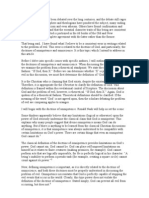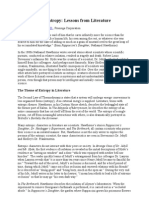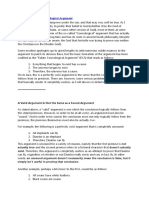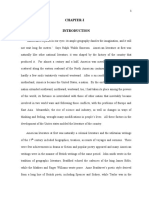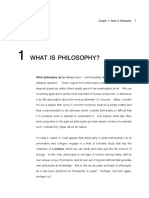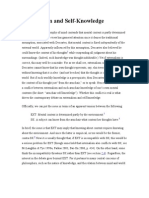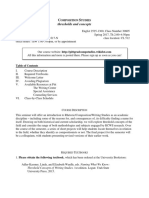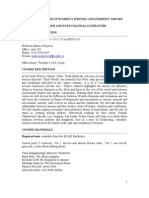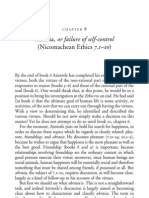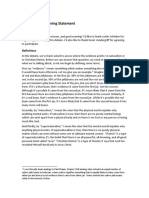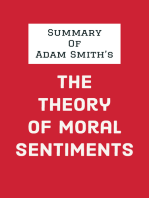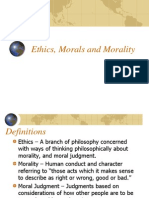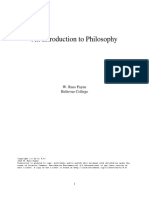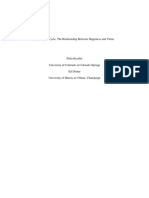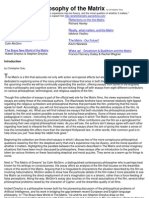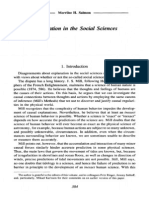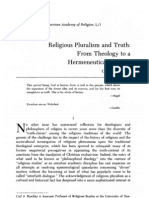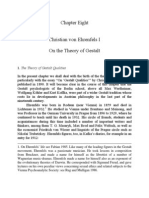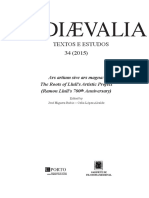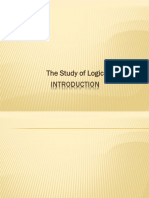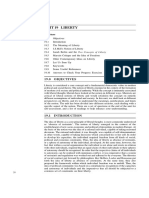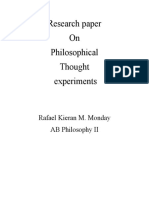Exstitentialism
Exstitentialism
Uploaded by
AdnanSmajićCopyright:
Available Formats
Exstitentialism
Exstitentialism
Uploaded by
AdnanSmajićCopyright
Available Formats
Share this document
Did you find this document useful?
Is this content inappropriate?
Copyright:
Available Formats
Exstitentialism
Exstitentialism
Uploaded by
AdnanSmajićCopyright:
Available Formats
Barbara W. Tuchman once said that books are the carriers of civilization.
Without books, history is silent, literature dumb, science crippled, thought and speculation at a standstill. A beautiful thought indeed. But then it comes to tracing the development of literature through time, researchers often group works from a certain timeframe together and label it as a period or movement. Literature periods are through its works depicting life and society of certain epoch and possibly the best thing we can learn from writings is development of thought and consciousness through centuries. However, many ideas and issues cannot be placed within single period because they are partially present in culture, literature, philosophy, etc. almost since the dawn of time. In this seminar paper, I am going to discuss existentialism from its beginning in early 19th century until nowadays and analyse influence of existentialists on other literal movements and on development of modern thought. Existentialism has philosophical roots in works of Friedrich Nietzsche, Martin Heidegger, and Sren Kierkegaard. In the other words, the existentialist writers are not representatives of a certain period, but rather followers of 20th century philosophy. Relating to that, first writers of existentialism havent even considered themselves as such so it is not a rare case that many existentialists are classified in several movements. According to Charles B. Guignon, after World War II, existentialism became a popular movement, attracting supporters and influencing a range of disciplines besides philosophy, including theology, drama, art, literature, and psychology. It is perhaps more productive to discuss the work of several individual authors than to attempt a sweeping overview of the whole movement. However, before engaging in discussion about major existentialist writers, I am going to sum up the philosophical foundations of existentialist thought. Basically, the main concern of writers was meaning of life through free will, choice, and personal responsibility. The belief is that it is the individual who is solely responsible for giving meaning to life and for living life passionately and sincerely. It is rejecting any idea of existence of ultimate purpose and meaning of life. Therefore, the individual must find or create meaning for his or her self. It was stated that the idea of created meaning is ultimately meaningless or even absurd. The main concepts of existentialism are that existence precedes essence and the absurd of the world. The first concept is based on belief that we simply exist and our actions are defining our purpose and giving an essence to our lives. Thus, human beings through their own consciousness create their own values and determine a meaning to their life. It is the being discussed in Sartres Existentialism is Humanism where he states that man first of all exists, encounters himself, surges up in the world and defines himself afterwards1. The concept of absurdism is closely related to the first one, stating that there is no meaning to be found in the world beyond what meaning we give to it. In his work The Myth of Sisyphus Camus pessimistically pointed out that there is only one truly serious philosophical problem, and that is suicide. Further in this paper, Ill discuss many of the literary works of Sren Kierkegaard, Franz Kafka, Fyodor Dostoyevsky, Jean-Paul Sartre, and mentioned Albert Camus which contain discussions about people who encounter the absurdity of the world.
Sartre, Jean-Paul. Existentialism is a Humanism http://www.marxists.org/reference/archive/sartre/works/exist/sartre.htm; Retrieved 2012-04-01.
The first literary important author considered as existentialist was Fyodor Dostoyevsky. Critics mostly come to an agreement that in world literature, few have been as universally admired as Dostoyevsky. He has been grouped with several different literary movements because his novels display so many characteristics so well. Crime and Punishment is a reflective example of how some of the principles of existentialist thinking can be corrupted, leading to ethical decay and personal destruction. The novel is significant because its protagonist Raskolnikov justifies his action believing that murder is permissible in pursuit of a higher purpose. As an example of existential crisis Sartre attributed quote from The Brothers Karamazov, if God did not exist, everything would be permitted, to Dostoyevsky himself. The writings of Franz Kafka, novelist from Austria-Hungary, are often associated with 20th century existentialism. The biggest impact on his writings has had death and destructions through Central and Western Europe. Like many existential writers, Franz Kafka saw the individual as being caught up in systems and bureaucracies that were beyond understanding. One of the most famous fragments of his writing is parable novel Before the law from The Process dealing with a man from the country that seeks the law and wishes to gain entry to the law through a doorway made particularly for him. It also clearly demonstrates the concept of existentialism, as the man from the country can only enter the gate using his own, individual path and how even existence becomes a kind of control over personal autonomy. Later in the twentieth century, the comedy troupe Monty Python would in a sense follow in Kafkas steps, presenting life as ultimately absurd. Even though he rejected label of existentialist, Albert Camus is still almost synonym for existential literature. He is also known for its philosophy of absurd which Ive mentioned as second concept. The absurd and the isolated nature of human existence is definitely a regular theme for Camus, especially in his works The Stranger and The Plague where he deals with characters caught up in situations and systems well beyond their control, and the ways in which they cope with such seeming futility. In his writings Camus presented the reader with dualisms: happiness and sadness, dark and light, life and death, etc. In The Myth of Sisyphus, this dualism becomes a paradox: We value our lives and existence so greatly, but at the same time we know we will eventually die, and ultimately our endeavours are meaningless. Frenchman Paul Sartre was undoubtedly the greatest existential thinker of 20th century and the only person to ever decline the Nobel Prize in Literature award. In the novel Nausea, Sartre tells story of an academic who becomes aware of the intense singularity of his own existence. Objects and even other people are completely outside of his experience, no matter what steps he takes to impart his own meanings onto them. This leads to the realization of complete freedom, but also complete isolation. However, on the contrary to other mentioned writers, Sartre took existentialism in a very positive direction. Given ultimate freedom, humans had ultimate responsibility for their own actions.
You might also like
- Napoleon Hill 12 Riches of Life and 17 Principles of SuccessDocument3 pagesNapoleon Hill 12 Riches of Life and 17 Principles of SuccessKH Tang98% (46)
- Achilles in VietnamDocument18 pagesAchilles in VietnamPatNo ratings yet
- CLAS 311 SyllabusDocument9 pagesCLAS 311 SyllabusSarah MurrayNo ratings yet
- The Problem of Evil Has Been Debated Over The Long CenturiesDocument7 pagesThe Problem of Evil Has Been Debated Over The Long CenturiesEzequiel GomesNo ratings yet
- Knowledge of God in Plantinga - Quodlibet JournalDocument13 pagesKnowledge of God in Plantinga - Quodlibet JournalEmil BartosNo ratings yet
- Liberalism and the Culture of Security: The Nineteenth-Century Rhetoric of ReformFrom EverandLiberalism and the Culture of Security: The Nineteenth-Century Rhetoric of ReformNo ratings yet
- 2br02b QuestionsDocument2 pages2br02b Questionsapi-346596008No ratings yet
- Scientists and Entropy in The LITERATUREDocument4 pagesScientists and Entropy in The LITERATUREVasilisa ZarNo ratings yet
- Jeffery Jay Lowder, in Defense of The Evidential Argument For A Reply To William Lane CraigDocument29 pagesJeffery Jay Lowder, in Defense of The Evidential Argument For A Reply To William Lane CraigGaspard de la NuitNo ratings yet
- The Problem of EvilDocument15 pagesThe Problem of EvilPascal AssafNo ratings yet
- A Critique of Descartes' Mind-Body DualismDocument18 pagesA Critique of Descartes' Mind-Body DualismjohnNo ratings yet
- Wittgenstein's Refutation of IdealismDocument32 pagesWittgenstein's Refutation of IdealismFaiz AlamNo ratings yet
- Refutation Argument KalamDocument6 pagesRefutation Argument Kalamoumar SYLLANo ratings yet
- Books To ReadDocument22 pagesBooks To ReadazyxairamNo ratings yet
- Racism and Cultural Clashes in Harper LeDocument32 pagesRacism and Cultural Clashes in Harper LeMaría Guadalupe Alcántara JoséNo ratings yet
- Freud On HamletDocument2 pagesFreud On HamletHye WonNo ratings yet
- Introduction To PhilosophyDocument142 pagesIntroduction To PhilosophyMary Jo LegaspiNo ratings yet
- Externalism and Self-KnowledgeDocument72 pagesExternalism and Self-KnowledgeeyeyethinkNo ratings yet
- I Think Therefore I AmDocument5 pagesI Think Therefore I AmAditi SinghNo ratings yet
- 21 EE - Building Better SentencesDocument10 pages21 EE - Building Better Sentenceshaena songNo ratings yet
- Miller - 2017 Spring - Comp Studies - SyllabusDocument16 pagesMiller - 2017 Spring - Comp Studies - Syllabusbenmiller314No ratings yet
- Encounters With Animal Minds: Journal of Consciousness StudiesDocument17 pagesEncounters With Animal Minds: Journal of Consciousness StudiesmanuelNo ratings yet
- English 444 McGill Syllabus Women in Post-Colonial SocietiesDocument6 pagesEnglish 444 McGill Syllabus Women in Post-Colonial SocietiesshainaaNo ratings yet
- Barriers To Critical ThinkingDocument11 pagesBarriers To Critical Thinkingbình nguyễnNo ratings yet
- John Tooby Department of Anthropology Harvard University: The Emergence of Evolutionary PsychologyDocument6 pagesJohn Tooby Department of Anthropology Harvard University: The Emergence of Evolutionary PsychologyleohellNo ratings yet
- The Gentle Genius of BonobosDocument3 pagesThe Gentle Genius of BonobosleontankxNo ratings yet
- PHIL 132-Introduction To Logic-M. Shabbir AhsenDocument4 pagesPHIL 132-Introduction To Logic-M. Shabbir AhsenAhsan SaeedNo ratings yet
- Descartes Rules For The Direction of The MindDocument2 pagesDescartes Rules For The Direction of The MindPablo BarbosaNo ratings yet
- Akrasia, or Failure of Self-Control (Nicomachean Ethics 7.1-10)Document24 pagesAkrasia, or Failure of Self-Control (Nicomachean Ethics 7.1-10)pope52100% (2)
- THEME GalgameshDocument18 pagesTHEME GalgameshElma BautistaNo ratings yet
- Kierkegaard On FaithDocument19 pagesKierkegaard On FaithJ. Raphael G.M. HudsonNo ratings yet
- Code of The Street Summary and Study GuideDocument3 pagesCode of The Street Summary and Study GuideJohnsonNo ratings yet
- The History of KnowledgeDocument82 pagesThe History of KnowledgeHUMBERTO ORIGENES ROMERO PORRASNo ratings yet
- Hannah ArendtDocument15 pagesHannah ArendtRohit KumarNo ratings yet
- Absurdity, Angst and The Meaning of LifeDocument15 pagesAbsurdity, Angst and The Meaning of Lifeklumer_xNo ratings yet
- Gender Roles in Sister Carrie and The JungleDocument6 pagesGender Roles in Sister Carrie and The JungleJenny LottNo ratings yet
- Outline of PhilosophyDocument11 pagesOutline of Philosophydobojac73No ratings yet
- Brown v. Board PresentationDocument20 pagesBrown v. Board Presentationclarice chanNo ratings yet
- Inside The Mind of A SociopathDocument6 pagesInside The Mind of A SociopathEric HuangNo ratings yet
- Mr. Lowder's Opening Statement: DefinitionsDocument42 pagesMr. Lowder's Opening Statement: DefinitionssokhratNo ratings yet
- Imre Lakatos - Falsification and The Methodology of Scientific Research Programs, - 1970Document6 pagesImre Lakatos - Falsification and The Methodology of Scientific Research Programs, - 1970SovietPrimeNo ratings yet
- Evolutionary Psychology and Feminism - Final Published 2011Document20 pagesEvolutionary Psychology and Feminism - Final Published 2011Rodrigo Caetano RahmeierNo ratings yet
- Comparative Essay StructureDocument12 pagesComparative Essay StructureMaria De Los Angeles Olaechea100% (1)
- Psychological CriticismDocument4 pagesPsychological CriticismHaui SacayNo ratings yet
- Reading Allowed: Making Sure The First "R" Comes FirstDocument236 pagesReading Allowed: Making Sure The First "R" Comes FirstJuliansyaNo ratings yet
- Plato Reading Questions/study Guide:: BackgroundDocument3 pagesPlato Reading Questions/study Guide:: BackgroundshigekaNo ratings yet
- Harriet Taylor MillDocument78 pagesHarriet Taylor MillMarcela B. TavaresNo ratings yet
- Ethics Morals MoralityDocument16 pagesEthics Morals MoralityAlvin TanNo ratings yet
- An Introduction To PhilosophyDocument138 pagesAn Introduction To PhilosophyShirley100% (1)
- American Atheist Magazine Sep 1982Document36 pagesAmerican Atheist Magazine Sep 1982American Atheists, Inc.50% (2)
- Existentialism Is A Humanism (Outline)Document3 pagesExistentialism Is A Humanism (Outline)Marjohn Punzal100% (1)
- PA 390 - Leadership Dynamics: School of Public, Nonprofit, and Health Administration Grand Valley State UniversityDocument11 pagesPA 390 - Leadership Dynamics: School of Public, Nonprofit, and Health Administration Grand Valley State UniversityBrian FlanaganNo ratings yet
- The Reach of ImagineDocument7 pagesThe Reach of ImagineSrijit SanyalNo ratings yet
- The Folly of SecularismDocument7 pagesThe Folly of SecularismOrso RaggianteNo ratings yet
- A Virtuous Cycle The Relationship Betwee PDFDocument24 pagesA Virtuous Cycle The Relationship Betwee PDFaerqwerNo ratings yet
- The Ethics of SocratesDocument4 pagesThe Ethics of SocratesGebretsadikNo ratings yet
- The Matrix Trilogy - PhilosophyDocument46 pagesThe Matrix Trilogy - Philosophyyashvir.dalaya100% (1)
- The Art of Involving The Person - Fundamental Existential Motivations As The Structure of The Motivational Process (Alfried Längle)Document12 pagesThe Art of Involving The Person - Fundamental Existential Motivations As The Structure of The Motivational Process (Alfried Längle)abaeram2No ratings yet
- God The Invisible KingDocument107 pagesGod The Invisible KingJayme SantosNo ratings yet
- Lesson 1Document3 pagesLesson 1Rea Mae ElevazoNo ratings yet
- 1 PhenomenologyDocument8 pages1 PhenomenologyAditya MadhavNo ratings yet
- Explanation in The Social Sciences: Merrilee H. SalmonDocument26 pagesExplanation in The Social Sciences: Merrilee H. SalmonCarlo ApablazaNo ratings yet
- Carl Raschke - Religious Pluralism and TruthDocument14 pagesCarl Raschke - Religious Pluralism and Truthdesmontes100% (1)
- PSY234 BackgroundcogpsyDocument34 pagesPSY234 BackgroundcogpsypotterheadNo ratings yet
- Christian Von Ehrenfels - On The Theory of GestaltDocument42 pagesChristian Von Ehrenfels - On The Theory of GestaltJohannes Tinctoris100% (1)
- Mediævalia: Textos E Estudos 34 (2015)Document210 pagesMediævalia: Textos E Estudos 34 (2015)Isaias K.No ratings yet
- Schmitt K 7WKDocument183 pagesSchmitt K 7WKEvan JackNo ratings yet
- MacDonald - Augustine's Cognitive Voluntariam in de Trinitate 11Document10 pagesMacDonald - Augustine's Cognitive Voluntariam in de Trinitate 11Philipp TschirkNo ratings yet
- 3 Ayx 034Document17 pages3 Ayx 034Katya DavissonNo ratings yet
- Five Educational PhilosophiesDocument22 pagesFive Educational PhilosophiesJezreel OcampoNo ratings yet
- My Experience With True LoveDocument111 pagesMy Experience With True LovebharathNo ratings yet
- Time in A Block UniverseDocument25 pagesTime in A Block UniverseKartik SrinivasanNo ratings yet
- AN Essay On Corporate Epistemology: Georg KENDocument19 pagesAN Essay On Corporate Epistemology: Georg KENVikas SarangdharNo ratings yet
- An2017 048Document53 pagesAn2017 048Jahin KamalNo ratings yet
- Behavior Therapy Is BehavioristicDocument5 pagesBehavior Therapy Is BehavioristicMaria Cecília BonfimNo ratings yet
- Introductory Lectures PDFDocument11 pagesIntroductory Lectures PDFJoNo ratings yet
- Module 1Document25 pagesModule 1radhaNo ratings yet
- Logic Prelims ReviewerDocument89 pagesLogic Prelims ReviewerLester EvangelistaNo ratings yet
- Consciousness Quantum Physics ShamanismDocument10 pagesConsciousness Quantum Physics ShamanismAnn Gelsheimer100% (2)
- Varc PDFDocument53 pagesVarc PDFRajanSharmaNo ratings yet
- Can You See It... Can You See God Within (2012)Document171 pagesCan You See It... Can You See God Within (2012)Predrag Bracanovich100% (1)
- Liberty Ignou PDFDocument10 pagesLiberty Ignou PDFBiswanath DehuryNo ratings yet
- Philo Q2 M2Document31 pagesPhilo Q2 M2Rienalyn Galsim67% (3)
- The Wisdom of The UpanishadsDocument69 pagesThe Wisdom of The UpanishadssaintxNo ratings yet
- Understanding SelfDocument40 pagesUnderstanding SelfDaniel Cuñado0% (1)
- Introduction To Moral PhilosophyDocument1 pageIntroduction To Moral PhilosophyElla Marie Lopez100% (1)
- Research Paper On Philosophical Thought Experiments: Rafael Kieran M. Monday AB Philosophy IIDocument34 pagesResearch Paper On Philosophical Thought Experiments: Rafael Kieran M. Monday AB Philosophy IIRafael Kieran MondayNo ratings yet



